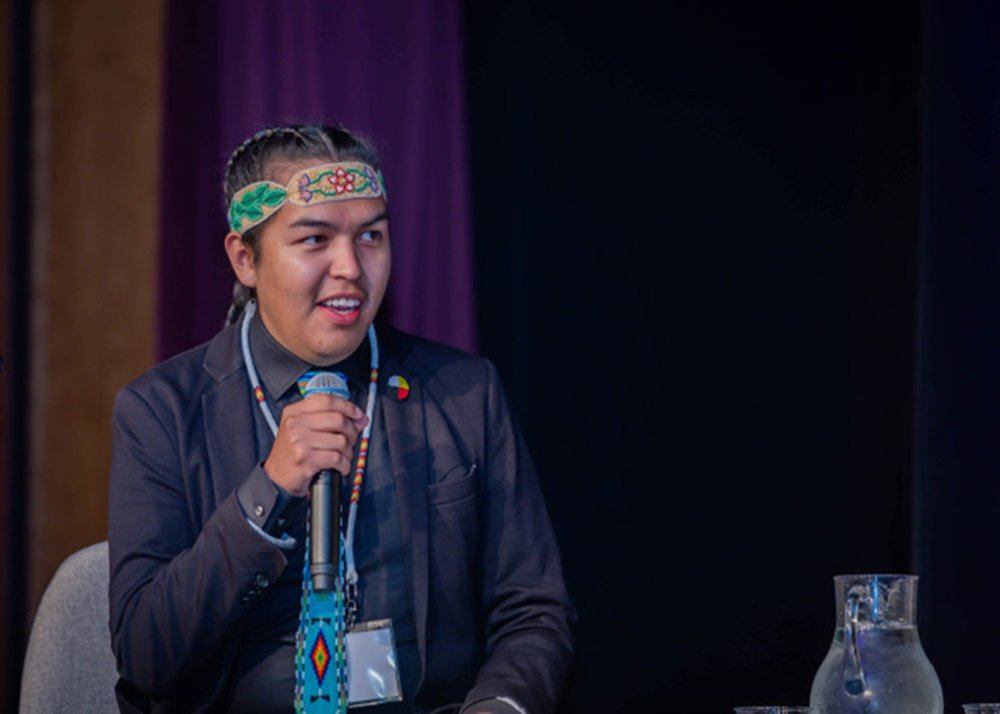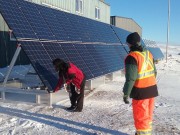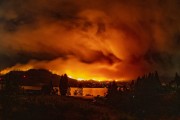The Pembina Institute is delighted to announce that Mihskakwan James Harper has joined the Board of Directors. Harper is a member of Sturgeon Lake Cree Nation in Treaty 8, Alberta. He is currently the business development manager at NRStor Inc., where he champions developing large-scale energy storage and clean microgrid projects in a way that empowers communities and contributes to meaningful climate action.
The following is an edited transcript of a conversation with Harper on July 13, 2023.
Pembina: When I was looking at your education journey, I noticed you’ve been in Winnipeg, at the University of Manitoba, École Polytechnique in Palaiseau (right next to Paris), the ESADE Business School in Barcelona, and the KTH Royal Institute of Technology in Stockholm. What was the highlight of those experiences?
Harper: My time in Stockholm at KTH was really awesome for learning about energy innovation. They have a lot of district heating and for our northern climate, especially in Canada, it’s very relevant. I definitely didn't know such a thing existed, let alone at that scale, which is citywide and even in the surrounding metropolitan areas. A lot of the district heating comes from the waste of the citizens. I remember asking, “You know, you just haul all this trash into an incinerator? What if it's toxic or creates fumes?” But, astonishingly, the population has such a great, collective mindset toward waste sorting that it's not really an issue. It was game changing for me to think about the intersection of human behavior, culture, energy and sustainability.
My time in Barcelona was mostly focused on business innovation. I was trying to figure out how to create a startup, how to be an entrepreneur, how to fundraise, how to pitch — all that stuff. We were trying to create a business case for a sustainability organization. I had to learn a lot of skills related to bringing an idea into the world and how to get people signed up to it.
Finally in Paris, it was more of an exploration, figuring out what niche of renewable energy I wanted to pursue. You could really go into the deepest, deepest places of solar technology, of wind technology, all that. And I realized that I was really keen on storage. That’s what shaped my decision for where I am now. NRStor is my full-time job: developing storage projects across Canada.
Pembina: In 2017, you were awarded the University of Manitoba's Distinguished Alumni Award for being a clean energy visionary. What does that mean to you, to be a clean energy visionary?
Harper: The climate is changing before our eyes, but also the reality is that we have invested so heavily into fossil fuels and supporting that whole economy. We're in a different place from Europe. I got a lot of hope from Europe, that we can move quickly if there's the right policy, if there's the right culture, and if there are the right financial tools available.
Part of my work is trying to advocate from a young person's lens and trying to make it very clear that we have we have to do more, faster. And when we do things in a good way — when we do clean energy projects in a good way — we also have a meaningful pathway for economic reconciliation. We have an opportunity to empower Indigenous communities who have never been empowered in this so-called economy before. Jobs and revenue creation and all those things will finally get shared equally.
Pembina: When it comes to the energy transition, what needs to move the fastest?
Harper: It's hard to say if there's a single factor that will really catalyze wider change. Something that comes to my mind without much thought is the influence and power our young people have. The more mobilized, empowered and informed that our young people are, the more positive the influence will be on policy-makers. Our young people are key to enabling this transition and moving us again faster and with more impact.
Pembina: In your capacity as a member of the SevenGen Council, what do you say to Indigenous youth about possible futures in the energy industry?
Harper: This actually goes back to 2019 when we had our first summit. I was asked this very same question. There was a lot of activism and attention toward pipeline development through traditional territories. I was saying we need warriors. That doesn’t only mean people out on the front lines, defending their territories. We also need warriors in boardrooms, in studios, conveying stories of impact and inspiring people to take action themselves. We need business people. We need lawyers. We need engineers to design the energy systems of tomorrow.
My challenge to the young people in the room was: “What's your gift and how can we help you become empowered?”
Pembina: My final question is about your podcast, “Decolonizing Power.” Can you recommend an episode for someone who has never listened to it? And why would you recommend that particular episode?
 Harper: One that stands out was when we talked to our good friend AJ Esquega in the first season. He led endeavours to create Canada’s first microgrid project in Kiashke Zaaging Anishinaabek, an Ojibwe Nation in Ontario. It's a solar storage setup, because the communities are otherwise reliant on diesel. He worked with so many partners. I can't even believe how many people were involved and how he was able to pull that all off. When he stands in front of a sign that says how many litres of diesel fuel are displaced, he gets quite emotional. Because now we have impact, now we have something meaningful. Through all this hardship of project development, he can look back and reflect, and he knows many diesel litres are saved and therefore how many tons of greenhouse gas emissions are reduced.
Harper: One that stands out was when we talked to our good friend AJ Esquega in the first season. He led endeavours to create Canada’s first microgrid project in Kiashke Zaaging Anishinaabek, an Ojibwe Nation in Ontario. It's a solar storage setup, because the communities are otherwise reliant on diesel. He worked with so many partners. I can't even believe how many people were involved and how he was able to pull that all off. When he stands in front of a sign that says how many litres of diesel fuel are displaced, he gets quite emotional. Because now we have impact, now we have something meaningful. Through all this hardship of project development, he can look back and reflect, and he knows many diesel litres are saved and therefore how many tons of greenhouse gas emissions are reduced.
It just means a lot to me. It really is something special.
Pembina: Thank you!









